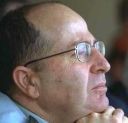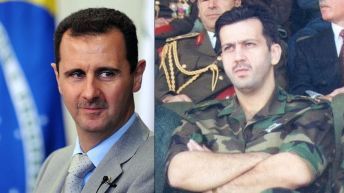 Everything you need to know about today’s coverage of Israel and the Mideast.
Everything you need to know about today’s coverage of Israel and the Mideast.
A prominent British editor apparently spent his gap year in a PFLP training camp, “and he wasn’t there to report.” The Syrian death toll hits 5,000. And has Israel turned a corner on issuing press cards for bloggers?
Peace Process
• David Mamet (Wall St. Journal, via Google News) on Israel, the West and human sacrifice:
In abandonment of the state of Israel, the West reverts to pagan sacrifice, once again, making a burnt offering not of that which one possesses, but of that which is another’s. As Realpolitik, the Liberal West’s anti-Semitism can be understood as like Chamberlain’s offering of Czechoslovakia to Hitler, a sop thrown to terrorism. On the level of conscience, it is a renewal of the debate on human sacrifice.
• CNN and the NY Times pick up on Mughrabi Gate. What a yawner that story’s become.
• Mahmoud Abbas symbolically raised the Palestinian flag on a pole outside UNESCO’s Paris headquarters. Reuters was on hand.
Media Matters
• Did The Guardian’s associate editor, Seumas Milne, spend his gap year training in a PFLP camp in Beirut? According to Harry’s Place, it appears to be the case.
According to a number of prominent journalists, he did indeed, and used to brag about it at cocktail parties. “He wasn’t there to report,” one journo who knew Milne back in the bad old days of Soviet stooging and third worldist terrorism, told me recently, adding that Milne was “so Stalinist, we used to say he had snow on his boots.”
The Popular Front for the Liberation of Palestine, founded by George Habash in 1967, was a Leninist terrorist organisation which, in Habash’s words, “held the ‘Guevara view’ of the ‘revolutionary human being’. A new breed of man had to emerge, among the Arabs as everywhere else.”
The PFLP takes credit for plenty of dirty deeds: In 1968, they were the first Palestinian terror group to hijack an airplane, and went on to hijack quite a few more. The PFLP also assassinated Israeli cabinet minister Rehavam Zeevi, 980, and claimed responsibility for several suicide bombings during the second intifada.
Milne and the PFLP? I wouldn’t be surprised.

• Turkish Prime Minister is not yet Time’s official man of the year. Recep Tayyip Erdogan, according to Time, won the most popular and least popular personality in the magazine’s online poll.
While the people have spoken loudly for (and against) Erdogan, in the end, TIME’s editors make the decision. The 2011 Person of the Year will be revealed this week.
• Looks like the Israeli Government Press Office is going to provide press credentials for bloggers. Israel Matzav published this GPO press release indicating some welcome bureaucratic change: “The Advisory Committee on Evaluating the Criteria for Issuing Government Press Office GPO Cards” issued “recommendations.” Stay tuned.
Arab Spring

• Hanging out with the press corps, cabinet minister Moshe Yaalon said not all the Arabs were ready democracy. The Financial Times (via Google News) was on hand:
Mr Yaalon said he believed that Tunisia, which elected a new government in October, was in fact “mature enough for democracy” but insisted that was not the case for the Palestinians.“We believe Palestinian society is not mature enough to exercise civil society,” he said.
His remark was denounced as “racist” by the Palestinian Authority.
• The UN’s human chief put the Syrian death toll at 5,000 and wants Syria to referred to the International Criminal Court. AP adds:
Pillay said that at least 300 children are among the dead, and there are thousands of people in detention.
• According to the Christian Science Monitor, Bashar Assad and his brother, Maher, are feuding, and that’s bad news:
A senior diplomatic source in Beirut says that the “hard-liners are completely in charge now” in Damascus, the Syrian capital.
“Clearly, the policy in Damascus now is you cannot show any weakness, no concessions. You use brutal force and it will get you more respect,” the diplomat says.
According to a senior Palestinian official with a Syria-backed faction, a “rivalry” has emerged between Assad and his younger – and reputedly more hard-line – brother, Maher. The younger Assad heads the Syrian Army’s Republican Guard and Fourth Division, the latter of which has played a lead role in the crackdown against opposition activists.

• Reporting under cover, The Guardian looks at arms smuggling along the Turkish-Syrian border. Definitely more profitable than blogging:
In this part of Syria, the young men tell how they have sold their wives’ jewellery, their cars and even their furniture to buy weapons and ammunition. “A man would rather sleep with his Kalashnikov than his wife,” they say in Idlib.
Rest O’ the Roundup
• Shimon Peres says he’s “ashamed” that lawmakers want to pass several laws he considers undemocratic. AP writes:
In an interview with the Yediot Ahronot daily published Tuesday, Peres singled out bills that would slash funding to dovish groups, silence Muslim calls to prayer and tighten a defamation law in a way that could hobble investigative reports.
Peres said he was “personally ashamed that they are trying to pass those laws.” The president’s office says he was accurately quoted.
• A deadly gun and grenade attack kills two and injures two dozen more in Belgium. From the fact that the BBC doesn’t name the perps, can we infer that this is the work of Arabs?
• The Washington Post looks at an Israeli plan to relocate Bedouin to an area near Maale Adumim.
• CNN looks at Jerusalem’s religious gender wars.
• A US court found Iran responsible for the 1998 bombings of US embassies in Kenya and Tanzania. The Washington Post writes:
Al-Qaeda carried out the attack, but the U.S. District Court for the District of Columbia found that the bombings would not have been possible without “direct assistance” from Tehran as well as Sudan. “The government of Iran,” Judge John D. Bates wrote in his 45-page decision, “aided, abetted and conspired with Hezbollah, Osama Bin Laden, and al Qaeda to launch large-scale bombing attacks against the United States by utilizing the sophisticated delivery mechanism of powerful suicide truck bombs.”
Iran’s assistance was not peripheral to the plot, Bates found.
(Image of Bashar Assad via Wikimedia Commons, Maher Assad via Wikimedia Commons)

